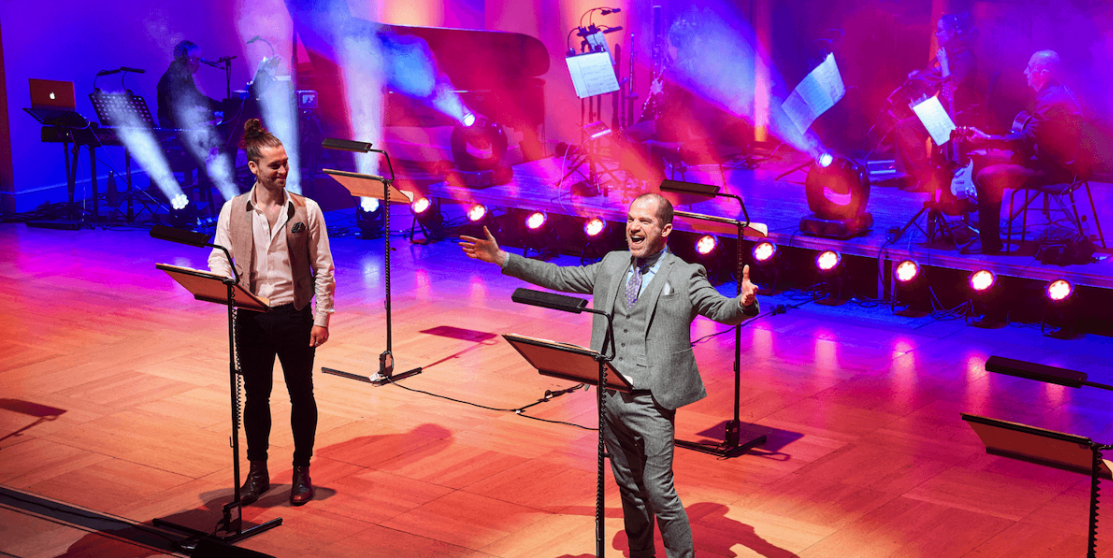We all know – or think we do – what happened on 5th November 1605 – ‘Gunpowder, treason and plot!’ In this streamed concert performance of the core of their new musical version, Ricky Allan and Kieran Lynn tackle the familiar story of Guy Fawkes and the Catholic conspiracy to blow up James I and the House of Lords during the King’s Speech at the opening of parliament. They offer us ten songs and a narrative to stitch it all together in anticipation of a fully worked up musical in the coming year.
They deliberately try to approach the story from oblique angles, some of which are more successful than others. Guy Fawkes, is decentred here, even omitted, which seems like a missed opportunity – the fact that little is known about him is usually an opportunity in a musical, where adherence to the historical facts is never a high priority. But there are rewards in looking instead at some of the other conspirators and their motivations. Musical theatre often works best where there are anguished conflicts of loyalty to develop and exploit, and the best of the songs are located in this particular groove.
The focus, at least in the present conception, is on Thomas Percy (Bradley Jaden) and his wife, Martha (Lucie Jones), and the leader of the plotters Robert Catesby (Oliver Tompsett). Comic relief is memorably provided by Daniel Boys as King James and there is a range of other plotters and supporters operating at present more as a chorus than as fully developed characters. There is also a large part for the Grime poet Debris Stevenson in narrating the action in a text that is rhymed throughout. The general message is that despite the inequity of persecution of Catholics in 17thcentury England you don’t get ‘toleration by killing your foes’, and if you ‘fight fire with fire, you get burned.’
The narration can be a bit tiresome and heavy-footed after a while, and one hopes it may be replaced with more dialogue and action in the final version. It is the old lesson that showing is better than telling. The same goes for the songs, some of which are so wordy that Allan struggles to find enough notes for the syllables. But when the situation and the text fuse economically there is a real success, as for example in ‘Blind Faith’ which explores the tensions between commitment to a cause and to a loved one, and ‘Taking Things into Own Hands’, a meditation on how personal grief can be transformed into fanaticism – and sung here with great skill by Oliver Tompsett.
The influence of ‘Hamilton’ is palpable at times, but this is perhaps inevitable in a story where the politics and the personal are pitted against one another so pointedly. And it certainly produces results. My favourite song here – ‘The Promise’ – plausibly sets James I’s specious and slippery undertakings to the Catholics alongside his lubricious delight in the handsome Thomas Percy. It inhabits much of the same haughty disdainful, ironic space as Miranda’s George III and with similar comic effects. A few more songs in this vein would enliven the whole.
The cast has no weak links, comprised as it is of an experienced and talented team of musical theatre regulars. The music, written in a blend of pop and folk, is technically demanding and it is greatly to the credit of everyone here that the delicate sections of gentle close harmony are as well delivered as the more strident and noisy ensembles.
Though this is a streamed concert performance the production values are well developed. The fine acoustic of the Cadogan Hall is well captured, and the orchestrations by Matthew Malone are deftly done, with plenty of instrumental colour and variety but nothing too heavy to obscure the delivery of text-heavy material. The separate lines of the duets and ensemble numbers are well blended, and while there are no costumes the show is backlit with a pleasing yet also edgy lighting design in blue and orange.
At present, the verdict on this show has to be an intrigued ‘not proven’. It is a promising theme, punctuated already by some catchy numbers that show dramatic potential in focusing contrasted characters. However, the drama of the story is currently recessed in favour of commentary on and around events. The actions as much as motives and emotions of the characters will need to be brought more to the fore if this musical is successfully to command a whole evening in the theatre.

